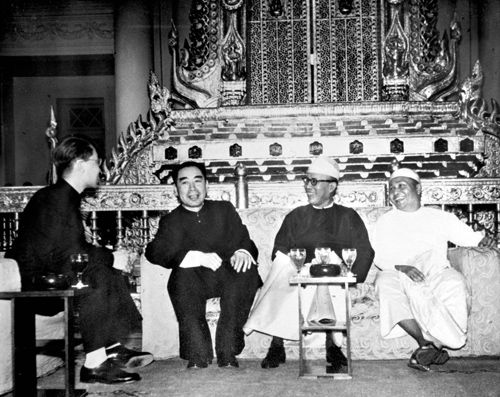|
 |
|
HISTORIC LEGACY: Chinese Premier Zhou Enlai (second left) meets with Burmese President Ba U (second right) in Yangon, Myanmar, on June 28, 1954 (XINHUA) |

2014 marks the 60th anniversary of the proclamation of the Five Principles of Peaceful Coexistence. Over the past six decades, all generations of the Chinese leadership have regarded the principles as the most valuable diplomatic tradition. They have also become widely accepted by the international community as pivotal norms of international relations.
The Five Principles of Peaceful Coexistence were raised just a few years after the founding of the People's Republic of China in 1949. After the birth of New China, the country faced huge challenges as it found itself caught between the two nuclear powers of the United States and the Soviet Union. China's original intent in raising the concept was to rise above the ideological strife of the two camps, find friendship, seek peace and safeguard national independence. The five principles have helped China distinguish its foreign policy from the hegemonic strategy of the United States and the Soviet Union, laying the moral and legal foundation for China to establish a foothold in the world.
Without these principles, there would be no friendly cooperation between China and other developing countries. China's return to the UN as well as the settlement of border disputes with many neighboring countries would not have been achieved, either. Moreover, without the principles, China would not have been able to grow into its current status.
Enduring relevance
Since it adopted the reform and opening-up policy in the late 1970s, China's foreign policy focus has shifted from revolutionary diplomacy to peace diplomacy. Having moved past the point of merely seeking survival and development space, it has set out to strengthen economic cooperation and integrate itself into the global system. However, China remains a developing country that often faces pressing challenges due to foreign interference. As such, it has consistently upheld the value of its independence.
China's current leadership continues to uphold this historic legacy as it speaks highly of the significance of the principles. At a study session of the Political Bureau of the Communist Party of China Central Committee in January 2013, only a few months after the Party's leadership transition, newly elected General Secretary Xi Jinping said that China has proposed and adhered to the Five Principles of Peaceful Coexistence, and made a solemn commitment to never seeking hegemony, adding that the country will unswervingly uphold these principles and commitments.
At the same time, the Chinese leadership understands that the world today is no longer that of 60 years ago. It is now a world of political multi-polarization and economic globalization. As an emerging major power, China inevitably is participating more and more in international affairs. The question for the Chinese Government now is how to creatively inherit the Five Principles of Peaceful Coexistence to ensure they align with the new global situation and China's national interests.
The question of whether the five principles are still applicable today has long been debated among China's academic circle as well as the public. Many claimed that "non-interference in internal affairs" is already outmoded, and have expressed hope that China would exert its influence to defend its national interests when the domestic crisis of a foreign country threatens China or a foreign country's domestic policy damages China's interests. Several renowned Chinese scholars have proposed the concepts of "creative intervention" and "constructive involvement," suggesting China increase its voice on international affairs.
The Chinese authorities believe that the argument is centered on the concept of national sovereignty. The traditional principles of independence are being challenged by globalization, unilateralism and the idea that human rights take precedence over sovereignty. Moreover, global issues such as climate change, terrorism and human dignity require countries to forge international consensus. However, it should be acknowledged that despite these developments, nation-states remain major actors in international politics, and sovereignty still embodies and guarantees national interests.
Other Asian countries that initiated the Five Principles of Peaceful Coexistence together with China—including India and Myanmar—also see these principles as having universal value. Developing countries know that in order to safeguard their rights to development in a world marked by "social Darwinism," they cannot give up the supremacy of state sovereignty. They must firmly support the principles of equality of all countries and consensus through consultation in the current global governance system.
| 